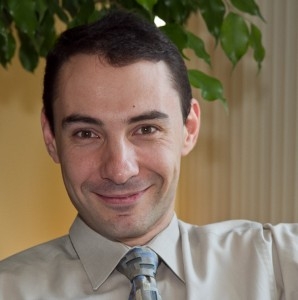Can the MEND Protocol Elevate Integrative Approaches to Alzheimer’s Disease?
July 1, 2016
by John Weeks, Publisher/Editor of The Integrator Blog News and Reports
Science Alert recently published the results of a study on just 10 subjects with Alzheimer’s: “Small trial shows memory loss from Alzheimer's disease can be reversed.” The study, led by visiting UCLA neurodegenerative disease researcher Dale Bredeson, MD (pictured, right) features what the researchers call the MEND protocol - Metabolic Enhancement for NeuroDegeneration. Notably, a week prior to the Science Alert piece, an announcement arrived in the in-box that George Washington University’s (GWU’s) integrative medicine program would offer the MEND protocol in an agreement with Muses Labs. Might MEND be the vehicle for elevating the value of an integrative approach to Alzheimer’s the way that Dean Ornish’s program was for reversing heart disease? I contacted Mikhail Kogan, MD, the medical director for GWU’s integrative medicine program to learn more about the program, and relationship. Kogan is a geriatrician who has been working with integrative and functional approaches with seniors for nearly a decade. “I developed a similar program five years ago with similar results. I had some cures.” “If I hadn’t met [Bredesen] two years ago I would have been developing a program of my own,” he said. “I decided to jump onto the bandwagon since they already have the structure to support patients and families in the program.” Kogan presently serves as an adviser to the Muses Labs program.
can be reversed.” The study, led by visiting UCLA neurodegenerative disease researcher Dale Bredeson, MD (pictured, right) features what the researchers call the MEND protocol - Metabolic Enhancement for NeuroDegeneration. Notably, a week prior to the Science Alert piece, an announcement arrived in the in-box that George Washington University’s (GWU’s) integrative medicine program would offer the MEND protocol in an agreement with Muses Labs. Might MEND be the vehicle for elevating the value of an integrative approach to Alzheimer’s the way that Dean Ornish’s program was for reversing heart disease? I contacted Mikhail Kogan, MD, the medical director for GWU’s integrative medicine program to learn more about the program, and relationship. Kogan is a geriatrician who has been working with integrative and functional approaches with seniors for nearly a decade. “I developed a similar program five years ago with similar results. I had some cures.” “If I hadn’t met [Bredesen] two years ago I would have been developing a program of my own,” he said. “I decided to jump onto the bandwagon since they already have the structure to support patients and families in the program.” Kogan presently serves as an adviser to the Muses Labs program.  Kogan made clear the value of the back-end support provided by Muses Labs, which is promoting the program and seeking new partners via a partnership with the UCLA Buck Institute. For starters, the protocol as described in this 2014 publication is always individualized and is complex, with 25 distinct elements. In this more recent 2016 publication in Aging, Reversal of Cognitive Decline in Alzheimer’s Disease, all 10 cases are individually described. These elements range from anti-inflammatory diet to curcumin, sleep recommendations, and much, much more. Muses Labs provides the software platform for the large amounts of data that are maintained and managed for each patient, says Kogan. Included are “genome, bio-specimen data, medical history, demographics, medications, patient lifestyle and cognitive ability.” The firm can also link patients to health coaches to manage that part of the family and patient relationship. Kogan’s center has their own coaches who GWU uses for their onsite patients. The participation with Muses Labs also offers an important research component. Data from all participants are pooled. In time, contributions from the distinct components may be able to be parsed out. He is in the process of working on his own Institutional review board approval at GWU. Kogan notes that he is interested in “keeping optimizing it, keeping making it more effective.” While GWU is the first academic health center to offer the MEND protocol, Kogan says he knows that others are looking at it. The protocol is also offered to individual physicians. Among the other advisers to Muses Labs are long-time integrative medicine leader and author Kenneth Pelletier, PhD, MD(hc). Comment: I recently had the opportunity to talk with a leading conventionally-oriented researcher who has been focusing more recently on integrative health practices and protocols. The researcher hues closely to standard practice and favors single agent trials, thereby avoiding the ambiguity of not knowing what part of a complex intervention may be the active agent. I typically respond to such views with all the grace of a junk-food-riddled hyperactive child in a supermarket aisle who is told he can’t have Cocoa-Puffs. Clearly, to most quickly learn the contributions that complex, personalized, integrative medical, naturopathic, functional, holistic nursing and TCM approaches can have, the old guard research community needs to get over it. Reverse the fields: first look for human outcomes, then explore what might be unnecessary in the original protocol. Alzheimer’s is, as Kogan notes, “the most expensive disease already” per person. The economic and human value of sustained breakthroughs can only grow. We wouldn’t have these data if we left our research priorities up to that old and reductive thinking.
Kogan made clear the value of the back-end support provided by Muses Labs, which is promoting the program and seeking new partners via a partnership with the UCLA Buck Institute. For starters, the protocol as described in this 2014 publication is always individualized and is complex, with 25 distinct elements. In this more recent 2016 publication in Aging, Reversal of Cognitive Decline in Alzheimer’s Disease, all 10 cases are individually described. These elements range from anti-inflammatory diet to curcumin, sleep recommendations, and much, much more. Muses Labs provides the software platform for the large amounts of data that are maintained and managed for each patient, says Kogan. Included are “genome, bio-specimen data, medical history, demographics, medications, patient lifestyle and cognitive ability.” The firm can also link patients to health coaches to manage that part of the family and patient relationship. Kogan’s center has their own coaches who GWU uses for their onsite patients. The participation with Muses Labs also offers an important research component. Data from all participants are pooled. In time, contributions from the distinct components may be able to be parsed out. He is in the process of working on his own Institutional review board approval at GWU. Kogan notes that he is interested in “keeping optimizing it, keeping making it more effective.” While GWU is the first academic health center to offer the MEND protocol, Kogan says he knows that others are looking at it. The protocol is also offered to individual physicians. Among the other advisers to Muses Labs are long-time integrative medicine leader and author Kenneth Pelletier, PhD, MD(hc). Comment: I recently had the opportunity to talk with a leading conventionally-oriented researcher who has been focusing more recently on integrative health practices and protocols. The researcher hues closely to standard practice and favors single agent trials, thereby avoiding the ambiguity of not knowing what part of a complex intervention may be the active agent. I typically respond to such views with all the grace of a junk-food-riddled hyperactive child in a supermarket aisle who is told he can’t have Cocoa-Puffs. Clearly, to most quickly learn the contributions that complex, personalized, integrative medical, naturopathic, functional, holistic nursing and TCM approaches can have, the old guard research community needs to get over it. Reverse the fields: first look for human outcomes, then explore what might be unnecessary in the original protocol. Alzheimer’s is, as Kogan notes, “the most expensive disease already” per person. The economic and human value of sustained breakthroughs can only grow. We wouldn’t have these data if we left our research priorities up to that old and reductive thinking.



















SHARE